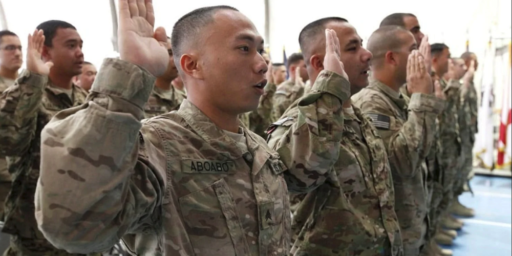Pentagon Alerted to Trouble in Ranks
LA Times — Pentagon Alerted to Trouble in Ranks
The Pentagon was warned repeatedly going back a decade that it was accepting military recruits with criminal histories and was too lenient with those already in uniform who exhibited violent or other troubling behavior. Six studies prepared over 10 years by an outside expert at the Pentagon’s request found that too little was being done to discipline lawbreakers in uniform or even identify problem recruits.
A 1998 study estimated that one-third of military recruits had arrest records. A 1995 report found that one out of four Army career enlisted personnel had committed one or more criminal offenses while on active duty. Yet many were allowed to reenlist or received promotions. Some received good-conduct medals or held top secret security clearances, the research found. The 1995 study cited the case of one soldier who was promoted to sergeant despite a record of behavior that included multiple assaults, drunk and disorderly conduct, property destruction and obstruction of justice. As recently as last year, only a month before some of the worst abuses of Iraqi detainees occurred at Abu Ghraib prison, one of the reports said some troops were in positions “where destructive acts could have the most serious consequences.” “An immediate problem faced by Defense is that there are military personnel with pre-service and in-service records that clearly establish a pattern of substandard behavior,” the 2003 report said. “These individuals constitute a high-risk group for destructive behavior and need to be identified.”
The September 2003 study, titled “Reducing the Threat of Destructive Behavior by Military Personnel” and released to The Times with the Pentagon’s permission, was written by Eli S. Flyer, a former senior analyst at the Defense Department and a longtime Pentagon consultant. It examined recruiting of active-duty troops and misconduct by uniformed personnel once they entered the armed forces. Military reservists undergo the same screening process as active-duty troops, Flyer said. Although the Pentagon adopted some new procedures, they were not adequate, Flyer’s most recent report said. The military services have resisted improving screening procedures because that “would reduce applicant supply,” the 2003 report said, alluding to problems some services have had in recent years meeting recruitment goals.
This is disturbing, although it doesn’t square with my (granted, now rather dated) experience. While there was a time that drunkeness and assault were considered a normal part of enlisted military culture, it had long passed by my tenure (1984-92).
Reporting of isolated anecdotes–one guy promoted to E-5?! — as if they were routine is not a good sign. Lumping “arrest records,” “criminal offenses,” and “some . . . were promoted” into the same paragraph gives the impression of grossly inflated numbers. There are a half dozen reports cited in the story. What are the aggregate numbers?




Greetings,
Retired from the military 3 years ago. One conviction of a DWI or related charge was enough to effectively end a career in the military. One conviction of almost any thing was also enough to end a career. I find this article to be over blown – if not on its face inaccurate, unless of course the Times is counting traffic tickets as convictions . . . . young people in the service do tend to drive a bit fast and that could explain the numbers! The Army (at least) is not having a great deal of difficulty in meeting either initial enlistment or reenlistment goals. I understand the Air Force and Navy are also doing fine. This is just a great example of the lovely LA Times coverage.
Regards,
Mike
I’m still in (as a reservist) but have served over 11 years in the Air Force and am the son of a career Air Force noncommissioned officer. My experience squares with Mike’s. One conviction of a serious offense is enough to end a career, and a conviction for a minor offense is pretty close to 100% effective in preventing promotion.
The figure that 1/3 of entering service members had been arrested is almost certainly vastly overblown, unless one decides that a directed appearance in traffic court constitutes an arrest. Indeed, the anecdotal evidence I most often hear is that one arrest is sufficient to end one’s plans of enlisting–the recruiter drops the prospect like a hot rock.
Third bump to this vein. DUI or DWI and you might as well quit. I don’t even know why this would upset anyone. The LA Times is hardly a credible news source any more.
This story reads a lot like a Michael Moore movie script. Snip here, snip there… look, I have a picture!
I’m thinking a lot of the arrests might have been traffic-related. In this area we have a lot of federal lands (national parks) with roads used by the public, especially around DC. Any traffic violation on those roads is a federal offense and ends up in federal court – even the misdemeanors. I can’t tell you how many “arrest warrants” go out on a daily basis for folks who are late paying their tickets or didn’t show for court. There are a ton of them.
Oops, got distracted by the boss and pushed the button to quickly…
I was going to finish by saying that we have a lot of young soldiers who come by the courthouse to pay their traffic fines or asking questions about the warrants.
Gad, I have a federal conviction too — for doing 30 in a 25 zone on Fort Wainwright on a delivery run. The MP told me if I paid the ticket it would be up to the judge (federal magistrate, maybe?) as to whether it would be reported to the state. I didn’t get any points on my license, so…
Maybe it would’ve been different if I’d gotten the one and only state speeding ticket I received in Alaska, before that one.
Federalism. Gotta love it.
Little research goes a long way:
http://www.gao.gov/archive/1999/ns99053.pdf
This is a Feb 99 report. Important stats on page 7.
13 percent of individuals enlisted required a ‘moral waiver.’ Of that 13 percent, 75 percent were preservice drug and alcohol abuse (read use), 20 percent were traffic or minor, and 3 percent were adult or juvenile felonies.
Further, since the article was likely written to further aggravate the Abu Ghurab issue, it is important to address the Army policy:
“Only the Army conducts an in-depth interview with enlistees whose record checks have not been received to determine the possibility of a concealed record and assigns them control numbers before sending them to basic training. Army officials told us that, with few exceptions, no one is sent to a first-duty station unless the records check has been received.”
I was unable to find the 1998 report anywhere. That’s strange since it should be an open-sourced report.
Tactics like this to discredit whoever is in power (the reason the Pentagon was named as the responsible party) are irresponsible and damage the credibility of the military to further political goals. The writer and publisher are ethically barren in my opinion.
—